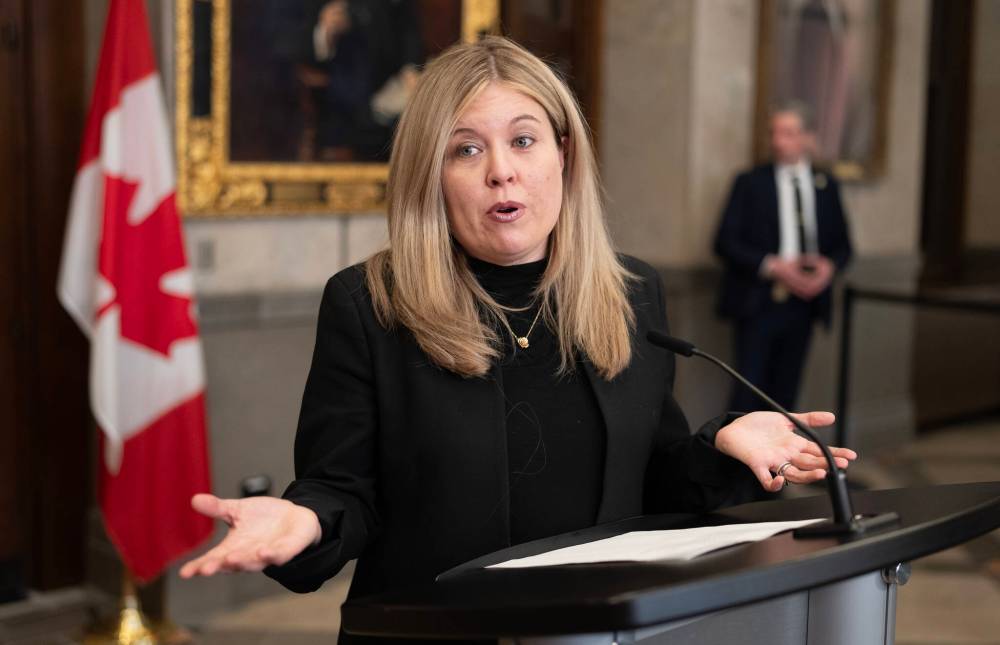A cynical debate over babies’ citizenship
Advertisement
Read this article for free:
or
Already have an account? Log in here »
To continue reading, please subscribe:
Monthly Digital Subscription
$1 per week for 24 weeks*
- Enjoy unlimited reading on winnipegfreepress.com
- Read the E-Edition, our digital replica newspaper
- Access News Break, our award-winning app
- Play interactive puzzles
*Billed as $4.00 plus GST every four weeks. After 24 weeks, price increases to the regular rate of $19.00 plus GST every four weeks. Offer available to new and qualified returning subscribers only. Cancel any time.
Monthly Digital Subscription
$4.75/week*
- Enjoy unlimited reading on winnipegfreepress.com
- Read the E-Edition, our digital replica newspaper
- Access News Break, our award-winning app
- Play interactive puzzles
*Billed as $19 plus GST every four weeks. Cancel any time.
To continue reading, please subscribe:
Add Free Press access to your Brandon Sun subscription for only an additional
$1 for the first 4 weeks*
*Your next subscription payment will increase by $1.00 and you will be charged $16.99 plus GST for four weeks. After four weeks, your payment will increase to $23.99 plus GST every four weeks.
Read unlimited articles for free today:
or
Already have an account? Log in here »
Is it a serious issue, or merely a politically motivated “solution” to a problem that doesn’t really exist?
Given the partisan rhetoric from both sides of the argument regarding the question of “birthright citizenship,” it’s hard for ordinary Canadians to tell.
Last week, Conservative MP and immigration critic Michelle Rempel Garner attempted to amend legislation tabled by Prime Minister Mark Carney’s government (Bill C-3, An Act to amend the Citizenship Act), which would create a path to citizenship for individuals born outside of Canada to Canadian parents who were also born outside of Canada — the so-called “Lost Canadians.”

The Canadian Press files
Conservative MP Michelle Rempel Garner is calling for restrictions on birthright citizenship.
Rempel Garner’s proposed amendment, which was defeated by the Liberal and Bloc Quebecois MPs on the House of Commons immigration committee, would have imposed barriers to so-called “birthright citizenship” by mandating that automatic citizenship would be limited to babies who have at least one parent who is either a Canadian citizen or permanent resident of the country.
She argued that the amendment was a necessary response to two distinct issues: the growing number of temporary residents in Canada and, secondly, the troubling practice of “birth tourism,” in which a woman travels to Canada for the specific purpose of giving birth so that her child will be a Canadian citizen.
In some jurisdictions, those children are derisively referred to as “anchor babies,” based on the allegation that the child’s status as an automatic citizen strengthens its non-citizen parents’ claim to immigration status or to avoid deportation.
In support of her amendment, Rempel Garner argued that “There are three million temporary residents in the country right now — seven per cent of the population — who are having children, and those children are using services at a rate that the government is not accounting or planning for.”
She framed the issue as urgent, but the reality is that the number of non-permanent residents in Canada has actually fallen following changes implemented by the federal government last year. Beyond that, Carney has said his government intends to cap the number of non-permanent residents in the country at just five per cent of the total population.
Rempel Garner points to data compiled by Statistics Canada which suggest that live births in Canada to non-resident mothers has increased by approximately 700 per cent over the past decade, but that same data reveal that those births represent a very small percentage of all births in the nation.
In 2024, for example, they were just 1,610 out of 367,347 births, or 0.44 per cent of all births that year. In 2023, the percentage was even lower, at just 0.42 per cent.
Does that sound like a crisis to you? Does it really put Canada’s health-care system at even greater risk of collapse than it already is due to other factors?
The answer may depend on your political perspective, but federal Justice Minister Sean Fraser told reporters last week that “I believe that we should maintain birthright citizenship in Canada … I think when you start to pick and choose who amongst Canadians gets the full benefits of citizenship, you obviously enter into a very troublesome conversation.”
That’s lofty language from our justice minister, but the reality is that a number of Canada’s allies, including Australia, Germany and the United Kingdom, have already implemented laws that limit entitlement to birthright citizenship. In particular, U.S. President Donald Trump has issued an executive order aimed at ending birthright citizenship for babies of undocumented immigrants and for people with temporary immigration status in America.
If those nations viewed birthright citizenship as an issue or threat that needed to be solved, it is likely that Rempel Garner and her legion of Conservative Party supporters feel the same way.
Given the polarizing nature of immigration politics, and its ability to drive donations and impact election results in ridings across the country, don’t expect the “birthright citizenship” issue to go away any time soon.
To the contrary, Rempel Garner’s efforts last week may signal the launch of a new level of division, cynicism and opportunism in Canadian politics. If so, the debate may reveal more about our values as Canadians than the motives of mothers who simply seek a better life for their babies.
Deveryn Ross is a political commentator living in Brandon. deverynrossletters@gmail.com X: @deverynross

